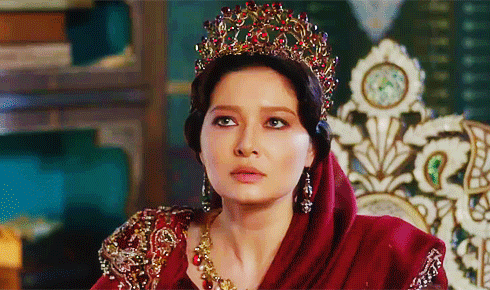#brunehilde regina
Note
Could there have been a backlash towards the death of Brunhilde?
Well, it's really difficult to know about this, because the sources only depict her as an heavily hated woman, so her death appears as the decision of a common strategy that no one never complains about later.
Of course, she may still possessed some allies, who may had to face a brutal change of allegeance after her death, and we know that a tradition states her burying site was in the Abbey St-Martin d'Autun, where her grave has remained visible until at least the end of the 18th century, meaning that nobody had any interest to destroy it any further (we even know for sure that the grave was reamenaged during the 15th and 17th century, in order to preserve it).

Here, a depiction of Brunehilde's grave, dating from the 18th century, and showing what was probably a 12th century-looking coffin [X].
4 notes
·
View notes
Text
In the Histories, Brunhild and Fredegund appear as political adversaries and moral opposites. Gregory encouraged his audience to compare the two queens by emphasising their differences. He said nothing bad of Brunhild, yet he accused Fredegund of a great many crimes, including murder, sacrilege, witchcraft, and treason.
…Looking beyond Gregory’s interpretation, Brunhild and Fredegund may not have been so different. Both queens reigned at the side of their husbands and then remained politically influential during their widowhood as mothers of their minor sons. Both formed close, politically useful relationships with some bishops and quarrelled with others. Both cared about the education of their children and made efforts to rescue daughters who fell into the hands of rival powers. They treated their inferiors in a manner befitting a ruler, defending honour and threatening violence much as did kings and other powerful men. Their skilful evocation of both fear and love would have made Machiavelli blush. They donated to the church, venerated the saints, and kept an eye on those who might use illegitimate sources of spiritual power, such as witchcraft or poison, with due attention. Other sources recognised this fundamental similarity: Venantius Fortunatus, ever the dutiful royal client, praised Fredegund and Brunhild alike, while the Chronicles of Fredegar, written from the safety of a later generation, criticised them equally. Yet Gregory insisted they were rivals and moral opposites. His task was not an easy one. Rumours of Fredegund’s misdeeds may have abounded, but stories of Brunhild’s virtues were rather more obscure. Thus, Gregory carefully arranged his material, encouraging his audience to compare the two and to find Brunhild to be the better. Why so complex a narrative strategy? Gregory laboured under burdensome constraints, coming into personal conflict with Fredegund, while finding Brunhild to be a powerful, if intimidating, patron.
-E.T. Dailey, “Queens, Consorts, Concubines: Gregory of Tours and the Women of the Merovingian Elite”
#historicwomendaily#merovingian period#fredegund#brunehilde#brunhild#gregory of tours#women in history#french history#fredegund regina#6th century#merovingian history#queue#my post
12 notes
·
View notes
Note
Hi sorry just wanted to say love ur account and ur merovingian posts especially also love ur choice of nurgulkosem for brunhilde, feel like she really suits as a face to the historical figure.
Hi! Oh, thanks, it really means the world for me! And yes, I really love Nurgul!Kösem, she's so regal, I couldn't see anyone better to represent a powerful queen like Brunehilde! 😍😍


4 notes
·
View notes
Note
Have you read or do you plan yo read Shelly Puhak's Dark Queens, about Fredegund & Brunhild?
Well, to be honest, I expect nothing but bullshit from this one, so at first I was totally against the fact to read it, but then I remember I want to include a part about bad takes on Fredegund and Brunehilde in my thesis, so I guess I would read it somehow... ¯_(ツ)_/¯
Anyway, if I read it nonethless, perhaps I’ll do a little review about it, and if someone had already read it, you anon or anyone else, don't hesitate to come speak about it, I'm curious about opinions!

(how god it’s so ridiculous...... the pain is huge.....)
#ask#anon#merovingian period#frankish history#fredegund regina#brunehilde regina#6th century#shelly puhak
4 notes
·
View notes
Note
Why did the court turn against Brunhilde after her son had been killed?
Because she was seen as a domineering figure, and we all know how sympathetic men can feel about domineering political women <3
1 note
·
View note
Note
I was wondering whether you think Bathildis regina voluntarily retired as regent or whether court factionalism caused her too?
Hello, anon ! I think it's both.
First of all, we know for sure that a lot of things happened before her official retirement, such as the death of one of her most closest allies, Bishop Sigobrandus of Paris, who was allegedly killed for being a bad influence over her and the regency council (at least that's what he was blamed for, but to me, it mostly sounds like a later wrapped-up justification from some chroniclers to explain why that man was killed, and defend in the same time the memory of "Good Blessed Saintly Queen" Bathildis, who was already an important saintly figure at that time). And from that specific mention, we can draw the conclusion that Bathildis indeed lived in a complicated time, with a lot of tension and political schemes, and then conclude that she was ultimately forced to retire herself by some combination of court factionalism.
That's at least the opinion of the majority of historians. But I personnaly find that proposition quite inaccurate and a little bit too deminishing, especially if we see the result as : a woman who is once again submitted by some men and forced to withdraw herself despite her own will.
I also think that the historical figure of Ebronius, her well-known nemesis in the eye of many historians, is a very easy scapegoat if we alledge the fact that he was a very hated man in his time for being from a non-aristocratic background and that his memory has been the object of a damnatio memoriae for centuries now. Of course, it's tempting to blame him for being the sole perpetrator of Bathildis' removal from the court, and her ultimate retreat in the Abbey of Chelles, like if she was imprisoned or exiled for good. But I think we need to see beyond that.
My take on this specific matter is different: for me, Bathildis was just acting like any other women of authority of her time and most of all, she was wisely presenting herself as the anti-Brunehilde.
Let me explain this: Brunehilde was a very influential figure during her first time as a regent, but both her downfall and death were a very gruesome proof of what could possibly happen to a woman who defy the laws of her gender. Indeed, what ultimately works against Brunehilde was that she was seen as transgressing figure who coopted power from men, i.e. her son, grandsons and great-grandsons. No matter how good her relationships with them were, or how relatable she was towards them, she was seen by others as a woman who was refusing to submit to public withdraw of senior women and widows, and alledgely mingled in political matters whereas she was strongly advised not to do so. And so by that, she litterally created a force of opposition against her: at the moment of her death, she was seen as a bad queen, which later wow her to be labelized as a Jezebel-like queen, the most insulting parallel someone can draw to describe a royal woman's behavior.
On the contrary, Bathildis removed herself from public view and litterally abided by the principles of her gender, letting her sons ruled by themselves whithout being an overly controlling figure like Brunehilde was herself and thus being a more discreet figure. Therefore, she marked herself as an anti-Brunehilde, consciously or not as we don't know for sure if she was really working on a strategy or no. Furthermore, it's really important to note that in some sources, Bathildis is also presented like a Jezebel figure and a bishop's killer, meaning that at some point, Bathildis' power was perhaps seen as an emulation of Brunehilde's controversial figure. Therefore perhaps explaining why she chose to retreat in order to prevent her to be harshly treated like Brunehilde had been…
4 notes
·
View notes
Note
I was reading through your hashtags on your post abt Nantechildis regina and I noticed you said that she had the makings of another powerful regent so I was curious as to what moves she made that PHD historians like yourself have information on that would have left this impression? Love your merovingian posts and can’t wait for more!!! I blame you for thiss!!! 🤭 you have gotten me obsessed with them 😂 especially fredegunde and brunhilde!!!! 😂 sorry this was just way too long 😂 ok bye 😃
Hi! First of all, when I'm speaking about powerful regents, what I intend is a woman who:
acts as a ruling figure for a minor sovereign, either by being his mother or any other motherly-figure;
has made connections with some powerful allies among the ruling elite or can dispose of family members able to back her up;
is known as an active pious founder.
These are some of the many similarities we can observe from the careers of several Merovingian regent women. For example, Brunehilde was the mother of Childebert II, she had connexions with many powerful men, even being the godmother of the daughter of one of them, and she is known for at least three major religious foundations. Those are the roots of her authoritiy for several decades.
Now, regarding Nantechildis, we can observe that:
she acted as Dagobert's main wife for 10 years, including 5 years without delevering a son, and as soon as Dagobert died, she was regarded as his executrix, managing the parting of his treasure equally between his two heirs. She also managed to enthrone her own son, who was only 5yo, and successfully guided him into a tour of the major cities of his regnum like Dagobert had done this 10 years before;
she had connexions with different political figures, and even managed to marry her own niece to one of the most important leader during her regency, which if you ask me, certainly means that she hosted the wedding and acted as a figure of authority for the newlywed couple;
not only did she founded several pious structures with Dagobert, but she also made major donations before and after his death, and honored her late brother with a lavish ceremony and lavish donations in his memory.
All that put together, I sincerely think Nantechildis could have been a major regent herself, if only she didn't die so early in her regency...
And also, I'm so glad to know that I may have got you interested in Frankish women, cause I love them, haha!
2 notes
·
View notes
Note
How would you rank each Merovingian regina based on the following; 1. Your personal favourites also love to know why 2. Political influence.
Each of them, oh it would be very long, haha, so I will go for some top 5 (in no particular order):
Fredegund ♥♥: unmatched! I love her unusual path, her strong will throughout her whole life, and I find her personal life really moving, with a loving husband and too much sons who died in infancy... Poor woman needs a hug!
Sichildis: probbaly the bitchiest of the bitchies, but it's really apalling to me to see how underrated she is actually despite her important and controversial role in her lifetime. I think she deserves way more attention than that!
Bilichildis I: a former slave who rose to royal consort status and was regarded as a political ally, even among high-ranking courtiers, should I say more? Theodebert really did her dirty, and I'm pretty sure his later fate after her death is pure karma!
Nantechildis: an other underrated woman, because she had everything in her hands, even during Dagobert's lifetime, and she could have been so much more if only she didn't died so early during her son's regency. Truelly, she was made for being another powerful regent.
Brunehilde: because she's Brunehilde! No matter how hard people try to present her as Fredegund's nemesis, I'm calling for share respect and appreciation of these two incredible women.
Regarding the political influence, this is quite difficult to estimate because we often lack of many details to appreciate the entourage in a more complete aspect, but I think these women can be seen as the peak influential at one point during their lives:
Chlodechildis I, consort to Chlodovech I: probably the most powerful woman of her time, who litterally commanded bishops and kings (her sons). I think we can presume of just an inch of what was actually her whole legacy, because the way she's whorshipped as a sainted figure in som randoms french villages says a lot about the impression she had left behind her.
Brunehilde, consort to Sigebert I: at some point in Gregory of Tours' chronicle, there is an allusion about how influential she was even during the lifetime of her husband, and that some austrasian aristocrats grew jealous of her, because she was able to intercede and speak in the name of her protegees. This is also one of the few merovingian reginae about which we can estimate the personal circle, as we know she had a goddaughter, or that she was a good friend to some poets or courtiers.
Bathildis, consort to Chlodovech II: I already explained in another post [X] how I think that Bathildis achieved so much influence that she was on the verge of becoming a second Brunehilde, and so allegedly had to step back to protect herself.
Bilichildis I, consort to Theodebert II: again, she was really an important royal intercessor, and was apparently taken in consideration regarding political and diplomatic matters, as far as becoming Brunehilde's equal in correspondence exchanges. I think it tells a lot!
Fredegund, consort to Chilperich I: because no matter how many times some people tried to overruled her or diminished her, she always found her way to stay at the top. And as far as I think she was able to fend for herself, we shouldn't imagine that this kind of longevity can exist without true and strong connections. Fredegund had always been very influential among Chilperich's court, and I will add to this that it's actually not sure he became monogamous for her (at least it's a good hypothesis, regarding the fact he wasn't one either in their previous relationship), but she surely was the one and one only to gave birth to his sons after the 560s. So in some way, she was totally ruling his family.
3 notes
·
View notes
Note
Hi! Could you please tell me more about the times when Brunehilde and Fredegund led armies? Thank you so much :)
Sure! First of all, we don’t have lots of account of these two being directly involved in war matters like conducting armies to battlefront, they have duces and patricii for that, but they may have been in charge for some specific events in which they had to represent a military authority, as regents.
First example happened in 581. Brunehilde, regent for Childebert II (11 at that time, still a minor as majority was effective c. 13/14), had to face a difficult shift of power inside the government after the death of the powerful nutritor Gogo: Gogo’s ally, the dux Lupus, became chased by other officials, such as Berthefredus and Ursio, two powerful men, and nearly killed by them. Even if Berthefredus was in fact one of her allies (she was the godmother of her daughter), Brunehilde decided to intervene and protect Lupus. According to Gregorius of Tours:
“Lupus vero dux Campanensis, cum iam diu a diversis fategaretur et spoliaretur assiduae et praesertim ab Ursione et Berthefredo [...]. Quod cernens Brunichildis regina, condolens fidelis sui insecutiones iniustas, praecingens se viriliter, inrupit medios hostium cuneos, dicens: ‘Nolite, o viri, nolite malum hoc facere, nolite persequere innocentem; nolite pro uno hominem committere proelium, quo solatium regionis intereat’.
Lupus, Duke of Champagne, had long been harassed and despoiled by those who were hostile to him, especially Ursio and Berthefried. [...] When Queen Brunhild learned of this, she was greatly incensed at the wrongs being done to her faithful supporter. She girded herself manly, then burst into the midst of enemy lines saying: ‘Stop!’ she shouted. ‘Warriors, I command you to stop this wicked behaviour! Stop harassing this person who has done you no harm! Stop fighting each other and bringing disaster upon our country, just because of this one man!’”
DLH, VI, 4. Qualiter Lupus a regno Childeberthi fugatus est
Technically, she didn’t acted as a real warlord, but we see the way she demonstrated her authority, especially in the way she is described (praecingens se viriliter), because she endorsed a manly quality, i.e. an authority as a regent. And she succeded in her intention and prevented the death of Lupus.
Even if Gregorius doesn’t mention it clearly, we know what it implied when he speaks about the way she is “girded herself” i.e., the famous cingulum, a belt which was a part of the military equipment during the Roman republic and empire, an element which eventually might have became an element worn by female regents from the merovingian dynasty: a century later, Bathildis, widow of Chlodovech II and regent for Chlothacar III, wore also a cingulum that she eventually offered to the monastery of Curbione, as a pious donation for alms (Vita Bath, A, c. 8). It may have been a symbol of military authority and personification of royal power as reges, duces and maiores palatii also worn it.
Second case is Fredegund, but it’s a little bit spurious as it only happened in the Liber Historiae Francorum, who also says that she killed Chilperich after she mixed him up with her lover while washing her hair, so.... \_(ツ)_/¯
Anyway, the LHF tells us the story that while being of the verge to attack his opponents, Ebroinus visited Bishop Audoenus of Rotomagus (Rouen), searching for his advices, and the religious man said to him “Remember of Fredegund!” as a some sort of tactical advice (LHF, 45), apparently refering to a battle in Trucia (Droizy) she led with her young son against the Austrasian armies (LHF, 36). In the telling, she is specifically described as travelling with the armies with the youn Chlothacar (around 8/9 years at that time), same goes for the way she is attacking Parisius (Paris) later in the reign (Chron, IV, 17):
“Cum dedicisset quod nimis esset exercitus Austrasiorum coniuncitis simul, consilium dedit Francos qui cum ea erant, dicens : « De nocte consurgamus contra eos cum lucernis, portantes socii qui nos precedunt, ramis silvarum in manibus, tintinnabolis super equos legatis, ut nos cognoscere ipsorum vigiles custodes hostium non queant. Inluciscente inicium diei, inruamus super eos, et forsitan eos devincimus. » Placuitque hoc consilium. Cum denunciatum fuisset placitum qua die ad preliandum in loco nuncupante Trucia in paygo Suessionico convenire deberent, illa, sicut consilium dederat, de nocte consurgens cum armorum apparatu, cum ramis in manibus vel reliqua quae superius diximus, ascensis equitibus, Chlothario parvolo rege in brachia vehitans, usque Trucia pervenerunt.
When [Fredegund] heard that the Austrasian army was very numerous, she gathered the Franks who were with her, held a council with them and said to them: “Let us approach them at night with torches; those of us who are ahead will hold tree branches in their hands, and bells will be tied to the horses, so that the night watchmen of their host cannot recognize us. And when the dawn breaks, we will come upon them, and maybe we will defeat them.” This plan suited them. While an agreement had been reached on the day when the armies should meet for combat at a place called Droizy in the pagus of Soissons, they set out at night, following the advice she had given, equipped with their weapons, with branches in their hands and with the other stratagems mentioned above; the riders being mounted on their horses, and the queen carrying in her arms the little king Clothar, they reached Droizy.”
LHF, 36. Ubi Fredegundis bellum cum Austrasiis ergit, eosque devictos Campaniam succendit
“Eo anno Fredegundis cum filio Clothario regi Parisius uel reliquas ciuitates rito barbaro occupavit et contra filius Childeberti regis Teudeberto et Teuderico movit exercitum loco nominante Latofao.
This year, Fredegund with her son, King Clothar, barbarically invests Paris as well as other cities, and she marched an army against the sons of King Childebert, Theudebert and Theuderic, in a place called Laffaux.”
Chron, IV, 17. De Fredegunde, quod Parisius invasit, et pugna contra Teudeberto
I absolutly don’t know how much we can give credit to these accounts, but it seems to have been a great story even among the Frankish noblemen. Don’t know if we could take it for granted, but I quite like the idea of a Fredegund seen as a model of power-ruling and tactics among the Franks.

#ask#encyclopedia-amazonica#women in history#fredegund regina#brunehilde regina#merovingian period#6th century#7th century#not so much about this i'm affraid#but the few is already interesting :)
39 notes
·
View notes
Photo







WOMEN IN HISTORY MONTH (insp) | Week 2: Favorite Regent Mothers
#historyedit#perioddramaedit#women in history#women in history month challenge#mine#brunehilde regina#merovingian period#6th century#ahhotep i#ancient egypt#17th dynasty#16th century bc#jeonghui#korean queens#joseon#15th century#catherine de medici#french queens#16th century#empress dowager cixi#yehe nara xingzhen#imperial china#qing dynasty#19th century#bathildis regina#7th century#irene of athens#byzantine empresses#8th century
316 notes
·
View notes
Photo






MEROVINGIAN REGINAE | Brunehilde Regina († 613)
Chief wife of Sigebert I Rex, to whom she gave two daughters, Ingund II Regina and Chlodosuinda III Regina, and one son, Childebert II Rex, she is probably one of the most powerful women of her time.
Although her date of birth remains unknown, we know that she was the youngest daughter of Athanagild of Toledo and his wife Goiswintha, and that she had an older sister, Galswintha Regina.
“Nam Galsuintha aetate senior a Brunichilde erat.
Galswinth was older than Brunhild.”
DLH, IV, 28. Quod Sigiberthus Brunichildem accepit
In 566, she married Sigebert I Rex, and remains his only known consort. As Sigebert’s wife, she may have lived in Mettis (Metz) or Colonia (Cologne), principal civitates of his regnum.
“Porro Sigyberthus rex cum videret, quod fratres eius indignas sibimet uxores acciperent et per vilitatem suam etiam ancillas in matrimonio sociarent, legationem in Hispaniam mittit et cum multis muneribus Brunichildem, Athanagilde regis filiam, petiit.
King Sigibert observed that his brothers were taking wives who were completely unworthy of them and were so far degrading themselves as to marry their own servants. He therefore sent messengers loaded with gifts to Spain and asked for the hand of Brunhild, the daughter of King Athanagild.”
DLH, IV, 27. De uxoribus Chilperici
The next year, in 567, her sister married too in the Gauls, and became the principal wife of Chilperich I Rex, half-brother of Sigebert. However, the marriage did not last long and Galswintha was found dead in her bed after only one year of marriage.
“Quae cum ad Chilpericum regem venisset, cum grande honore suscepta eiusque est sociata coniugio; a quo etiam magno amore diligebatur. Detulerat enim secum magnos thesauros. Sed per amorem Fredegundis, quam prius habuerat, ortum est inter eos grande scandalum. Iam enim in lege catholica conversa fuerat et chrismata. Cumque se regi quaereretur assiduae iniurias, perferre diceretque, nullam se dignitatem cum eodem habere, petiit, ut, relictis thesauris quos secum detulerat, libera redire permitteretur ad patriam. Quod ille per ingenia dissimulans, verbis eam lenibus demulsit. Ad extremum enim suggillari iussit a puero, mortuamque repperit in strato.
When [Galswinth] reached the court of King Chilperic, he welcomed her with great honour and made her his wife. He loved her very dearly, for she had brought a large dowry with her. A great quarrel soon ensued between the two of them, however, because he also loved Fredegund, whom he had married before he married Galswinth. Galswinth was converted to the Catholic faith and baptized with the chrism. She never stopped complaining to the King about the insults which she had to endure. According to her he showed no respect for her at all, and she begged that she might be permitted to go back home, even if it meant leaving behind all the treasures which she had brought with her. Chilperic did his best to pacify her with smooth excuses and by denying the truth as convincingly as he could. In the end he had her garrotted by one of his servants and so found her dead in bed.”
DLH, IV, 28. De uxoribus Chilperici
As she was childless, according to the law, all her possessions and properties had to pass to her legal heir, i.e. her sister Brunehilde Regina. As this inheritance would have deprived him of major cities of his regnum, Chilperich I Rex refused Brunehilde’s rights on it, and Sigebert called for a mediation, but the two brothers did not reach an agreement and grew an hostility between them.
In 575, due to this common hostility and to several military assaults, Sigebert called a war against his brother and successfully led an army to the west, in the future Neustria. Brunehilde followed him with her children, and was present in Parisius (Paris) when her husband was ultimately killed, perhaps on the orders of Chilperich I Rex who had been forced to retreat in the civitas of Turnaco (Tournai). Taken as a prisoner and deprived of all of her treasuries, she was exiled in Rotomagus (Rouen), separated from her daughters who were send to Meldicus (Meaux), meanwhile her son was taken in charge by nobiles and crowned new rex over Mettis (Metz) at 5.
“Igitur interempto Sigybertho rege apud Victuriacum villam, Brunichildis regina cum filiis Parisius resedebat. Quod factum cum ad eam perlatum fuisset et, conturbata dolore ac lucto, quid ageret ignoraret, Gundovaldus dux adpraehensum Childeberthum, filium eius parvolum, furtim abstulit ereptumque ab immenente morte, collectisque gentibus super quas pater eius regnum tenuerat, regem instituit, vix lustro aetatis uno iam peracto. Qui die dominici natalis regnare coepit. Anno igitur primo regni eius Chilpericus rex Parisius venit adpraehensamque Brunichildem apud Rodomaginsem civitatem in exilio trusit thesaurisque eius, quos Parisius detulerat, abstulit; filias vero eius Meledus urbe tenire praecipit.
At the moment when King Sigibert was killed in Vitry, Queen Brunhild was in residence with her children in Paris. When the news was announced to her, she was prostrate with anguish and grief, and she hardly knew what she was doing. Duke Gundovald took charge of her little son Childebert and removed him from her in secret, snatching him from certain death. Gundovald assembled the people over whom Sigibert had reigned and proclaimed Childebert King, although he was barely five years old. Childebert began to reign on Christmas Day. In the first year of Childebert’s rule, King Chilperic came to Paris, seized hold of Brunhild, banished her to the city of Rouen and took possession of the treasure which she had brought to Paris. He ordered her daughters to be held in custody in Meaux.”
DLH, V, 1. De Childeberthi iunioris regno et matre eius
During her captivity, she was visited by Merovech Rex, son of Chilperich I Rex, who then married her with the help of his godfather, Bishop Praetextatus, perhaps in order to strengthen his own power; Brunehilde’s consent on this matter is unknown, and it is probable that she was actually married by force rather than falling in love with a young man, as some scholars want to see it... However, since they were aunt and nephew, the marriage was contrary to the canon law, and Chilperich rapidly intervened to separate them: Merovech was tonsured to nullify the ceremony, and Brunehilde sent away with her daughters to reunite with her son, in Austrasia.
She then sought the regency on behalf of her son, even if she had to face the strong disapprobation of the nobiles, mostly the powerful Gogo. From 576 to 583, she nonetheless personified the true power in Austrasia, building up political alliances, such as with her brother-in-law Guntchramn Rex or with Hispania through the marriage of her daughter Ingund II Regina to prince Hermenegild, and was known as an excellent administrative reformer. She also had to face some opposition against her, such as the conspiration led in 587 by three nobiles, Rauchingus, Ursio and Berthefredus, who tried to assassinate her and Childebert. As the regina-mother, she seemed to maintain herself within in her family, as she had a devoted (and perhaps low-ranking) daughter-in-law, Faileuba Regina, who never tried to challenge her superiority.
In 587 again, she attended with her daughter Chlodosuinda III Regina and Faileuba Regina, to the Treaty of Andelao (Andelot), where Childebert and Guntchramn agreed on Guntchramn’s succession and the future of the women when they both would be dead: she was reaffirmed in her own rights as the heir of her sister and as the mother of the rex. She also initiated a correspondence with both byzantine emperors and pope Gregorius, and personally intervene when her daughter Ingund II had to fled the Hispania and tried her best to take her home with her child, however in vain.
Upon the death of her son in 596, she pursued her ruling by being appointed regent again on behalf of her two grandsons, Theodorich II Rex, rex over Burgundia, and Theodebert II Rex, rex over Austrasia. But she started to find resistance in the person of her granddaughter-in-law, Bilichildis I Regina, a former slave-girl she had trained. With new opposition from the nobiles, she was forced in 599 to retire from Austrasia, where she was actually living, and joined Theodorich in Burgundia with her granddaughter, Theodelina Regina.
“Eo anno Brunechildis ab Austrasies eiecta est et in Arciacinsem campaniam a quidam homini paupero singula reperitur. Secundum eius peticionem ipsam ad Teuderico perduxit. Teudericus aviam suam Brunechildem libetner recipiens gloriose honrat.
This year, Brunhild was driven out by the Austrasians. A poor man meets her, all alone, near Arcis in Champagne. In accordance with her wishes, he led her to Theuderic. Theuderic welcomes his grandmother Brunhild and covers her with honor.”
Chron, IV, 19. De Brunechilde, qualiter de Auster est egecta
She quickly became a prominent figure of Theodorich’s immediate entourage, and dominated his inner-court, even avoiding, according to the sources, the consumption of his marriage with the wisigothic princess, Ermenberga.
With her new advisor, Protadius, she started to form a faction waging war against Chlothacar II Rex, who was actually growing in importance, and tried to maintain diplomatic relationship with Theodebert II Rex and Bilichildis, with whom she entertained a regular correspondence. She was an important religious builder with three major foundations in Augustodunum (Autun), even if she also had troubles with religious men, especially with Colombanus who accused her great-grandchildren of being bastards because they were born from concubines and not from a wedded wife.
In 613, after the death of Theodorich II Rex, and in absence of a powerful mother to claim the guardianship, she became regent for the third time, for her great-grandson, Sigebert II Rex, still a child. But Warnacharius II, Maior Palatii of Burgundia, alongside Pippin I and Arnulf of Mettis, resentful towards her, abandoned her cause and joined Chlothacar II Rex that they recognized as the rightful leader of the Franks.
Betrayed by the rest of her leading nobiles, she fled with Theodelina, but they were arrested and delivered in Rionava (Renève) to Chlothacar, who accused her of the murders of ten reges and then sentenced her to death with her young great-grandsons. She was tortured and humiliated in front of the whole army, then tied by foot and hair to a wild horse and torn apart. The remains of her body were burnt and the ashes buried in the Abbey of Saint-Martin d’Autun that she had founded in 602.
“Factionem Warnachariae maioris domus cum reliquis maxime totis procerebus de regnum Burgundiae Brunechildis ab Erpone comestaboli de pago Vltraiorano ex uilla Orba una cum Theudilanae germana Theuderici producitur et Chlothario Rionaua uico super Vincenna fluuio presentatur. [...] Chlotharius, cum Brunechildis suum presentatur conspectum et odium contra ipsam nimium haberit, repotans ei eo quod decem reges Francorum per ipsam interfecti fuissent - id est Sigybertus et Meroeus et genitor suos Chilpericus, Theudebertus et filius suos Chlotharius, item Meroeus filius Chlothariae, Theudericus et eiusdem filiae tres, qui ad presens estincti fuerant - per triduo eam diuersis tormentis adfectam, iobetque eam prius camillum per omne exercito sedentem perducere, post haec comam capitis, unum pedem et brachium ad ueciosissemum aequum caudam legare: ibique calcibus et uelocitate cursus membratim disrumpetur. .
Following the maneuvers of Warnacharius, the mayor of the palace, and of almost all the other great men of the kingdom of Burgundy, Brunhild, at the same time as Theodelane, Theuderic's sister, was led out of the domain of Orbe by the count Herpo in the district of Jura and was presented to Clothar in the village of Renève, on the Vingeanne. [...] Clothar, before whom Brunhild is presented and who harbored a lively hatred towards him, imputes to her the murder of ten kings, namely Sigebert and Merovech, as well as their father Chilperic, Theudebert and his son Clothar, a another Merovech, Clothar's son, Theuderic and his three sons, who had just been killed. After having inflicted various torments on her for three days, he ordered that she be led through the whole army perched on a camel, then tied by the hair, a foot and an arm to the tail of a particularly fiery horse. Then she was tied to the feet of wild horses and torn apart limb from limb.”
Chron, IV, 42. De quod Chlotarius regnum Burgundiae et Auster recipit et filius Teuderici occisit
#historyedit#perioddramaedit#women in history#merovingian queens#merovingian reginae meme#brunehilde regina#merovingian period#6th century#7th century#mine#she's very fascinating#but also difficult to handle#actually i think a lot of scholars totally misunderstand her#too much sources on her#i had to chose because the post was already long enough!
120 notes
·
View notes
Note
This is going to sound completely random but do you think Brunehaut and Fredegund would have looked positively on Alienor d'Aquitaine or Melisende of Jerusalem?
Hmmm… this is really a tough one! Joke aside, I think this is really difficult to put in the shoes of people who were by definition so different from each other, because their lives and thus the condition of their own agencies or the way they were using it were really differents. For example, Brunehilde appears as a powerful woman for a large part of her life, but this is also because she became a widow early, while in the contrary Alienor was married for nearly 40 years of her life (even if there is a small gap between her two weddings).
Besides, as the proverb says it, “there is no one more blind than he who does not wish to see”: which I mean by this, is that a lot of people tend to see or judge other than themselves, and not really see their own actions as they really are. The way Alienor acted as queen of England, and above all the way she was imprisoned by her husband would perhaps have been a matter of comments and of judgments, as people always like to think they could do better. Particularly in the case of Brunehilde and Fredegund, who both had to fight against forms of exile and imprisonment, and succeeded in that way.
So I would say that both Brunehilde and Fredegund would perhaps looked down on Alienor of Aquitaine, because in their own vision, she could have been a “loser” and a traitor to her own family. Joke’s on Brunehilde perhaps, because she also had quite skeletons in her own closet regarding how she accepted what her family wanted from her, but I think both would have been like: “Oh, this is really pitiful, honey, you missed the whole point…”
Melisende’s case is different, and perhaps more alike to both Fredegund and Brunehilde’s ones, as they experienced both regency with a child growing of age. The difference for me is that where Melisende seems to have eventually accepted her fate as retired regent, this is not the case at all for Brunehilde who constantly tried to maintained and strengthened her own position at court. Fredegund is more difficult to perceive as she died in the end of her regency, so it is tricky to assert if she was ready to let go her position as regent and let her son rule by himself, or if she would have been on the breach like Brunehilde. I would say that they would have look good on her, but perhaps Brunehilde would think she was making a mistake by retiring herself from the political scene, as the tireless regent she was…
Hope I could respond to your question!
#ask#goldentailedmermaids#women in history#fredegund regina#brunehilde regina#melisende of jerusalem#eleanor of aquitaine
15 notes
·
View notes
Text
Top 5 favorite reginae (in no particular order)
Fredegund Regina: Chilperich I’s beloved chief wife, she became a powerful woman despite being probably from a low-ranking birth (at least not a high-ranking one) and bore him 6 children, including 5 sons. After Chilperich’s murder, she overcame her political opponents and established a regency for her infant son, Chlothacar II. She died peacefully in 597.
Beretrudis Regina: Chlothacar II’s beloved chief wife, she was a popular consort, even among aristocrats and high-ranking officials, who respected her according to the sources. Mother of Dagobert I, she learned about and revealed a major conspiracy, saving thus the life of her husband. She died in 619 and was deeply mourned by Chlothacar II.
Brunehilde Regina: Sigebert I’s chief wife, mother of Childebert II, grandmother of Theodebert II and Theodorich II, and greatgrandmother of Sigebert II and other princes, she was probably the most powerful woman of her time. A shrew politician, a skilled intellectual and a domineering figure, she succeded in establishing a powerful regency after the death of the guardian (nutritor) of her son, then ruled besides him as political partners until the unexpected death of Childebert II c. 595. After the loss of her position as the mother of the ruling sovereign, her political influence started to being criticize by the local nobility, especially as she had build a strong female authority inside the palatium. Deeply engaged in the political battles over the whole Gauls, she made herself a target for aristocracy and other opponents, and was finally executed in a brutally way by her most major rival, Chlothacar II, in 613.
Ingund I Regina: Chlothacar I’s chief wife and mother of 5 of his sons, she was probably the most influent and powerful woman of his harem. Probably in order to secure her own position, she made her sister Aregund joining her as one of Chlothacar’s consorts, meaning that over the 7 known sons of the rex, 6 were bore by the sisters. She died at a unknown date.
Bilichildis I Regina: Theodebert II’s chief wife, she rose from a simple slave to being the most powerful woman of the inner-court of the rex. According to the sources, she was bought and trained by Brunehilde, Theodebert’s grandmother, but she eventually turned against her and colluded with some of her rivals to having her expelled from the palace. She bore to Theodebert a daughter, whose name remains unknown, and took a part in the diplomatic activity of the Gauls by maintaining a correspondance with Brunehilde, now retired in the regnum of her other grandson, rex over Burgundia. She died in 610, the chronicle implying that she could have been killed by Theodebert.
#merovingian period#merovingian reginae#fredegund regina#beretrudis regina#brunehilde regina#ingund i regina#bilichildis i regina#6th century#7th century
18 notes
·
View notes
Note
Hace you ever heard about this "2 Queens" animation movie about Fredegonde d& Brunehid? It was in development some years ago and it never came to be made but the trailer is on YT. I wish Netflix took charge of this ost lost project...
Sure! I even made a small gifset of it when I was discovering all the characters and the period: https://queenfredegund.tumblr.com/tagged/the%202%20queens.
I have actually kinda of mix feelings about that trailer: on one hand I’m sad that the project didn’t come to be made, but on an other, based on the few we see in it (Brunehilde and Fredegund giggling together like good friends, Fredegund apparently killing Galswintha (?) or laughing like a demonic sorceress…) perhaps it’s for the better I couldn’t see it…
3 notes
·
View notes
Photo








MEROVINGIAN REGINAE | Unnamed concubines (5th century-7th century)
Concubine A, concubine of Chlodovech I Rex, mother of Theodorich I Rex
She is only quoted once by Gregorius of Tours, and is oftenly perceived as a Frankish rhenan princess by some historians, though this theory is heavily debated and not really interesting.
“[...] habens iam de concubina filium nomine Theudericum.
Clovis already had a son called Theuderic by one of his mistresses.”
DLH, II, 28. Quod Chlodovechus Chrodigilde accepit
Concubine B, concubine of Theodorich I Rex, mother of Theodebert I Rex
She is oftenly called “Eustère”, thank to a 17th-century’s falsification, but her real name is unknown. It is as well unknown if she was still alived when her son appeared for the first time in Gregorius of Tours’ chronicle.
“Habebat iam tunc Theudoricus filium nomen Theudobertum, elegantem atque utilem.
Theuderic already had a son called Theudebert, an elegant and able young man.”
DLH, III, 1. De filiis Chlodovechi
Concubine C, concubine of Theodorich II Rex, mother of Sigebert II Rex
She gave birth to her son in 602/603, and apparently remained under the lead of Brunehilde Regina. She was then never considered as a chief or a main wife.
“Anno VII regni Theuderici de concubina filius nascitur nomen Sigybertus [...].
The seventh year of the reign of Theuderic, he has, of a concubine, a son, named Sigebert [...].”
Chron, IV, 21. De filium Teuderici natum, et Aegyla patricius interficetur
In 613, after Theodorich’s death, her son Sigebert was appointed rex over Austrasia and Burgundia, under Brunehilde’s third regency. Concubine C was then never seen as a potential regent or was perhaps already dead. However, soon afterwards, a conspiration led by Warnacharius II, Maior Palatii of Burgundia, alongside with Pippin I and Bishop Arnulf of Mettis (Metz), led to the downfall of Brunehilde Regina and her offspring: Sigebert II Rex was killed in the year 613, only three months after his coronation.
“Sigybertus et Corbus filius Theuderici iusso Chlothariae interfecti sunt.
Sigebert and Corbus, Theuderich’s sons, were killed on the orders of Clothar.”
Chron, IV, 42. De quod Chlotarius regnum Burgundiae et Auster recipit et filius Teuderici occisit
Concubine D, concubine of Theodorich II Rex, mother of Childebert Rex
She gave birth to her son in 603, and apparently remained under the lead of Brunehilde Regina. She was then never considered as a chief or a main wife.
“Anno VIII regni Teuderici de concubina nascitur ei filius nomen Childebertus. [...]
In the eighth year of Theuderich’s reign, he had a son named Childebert from a concubine.”
Chron, IV, 24. De exilium sancti Desideriae episcopi
According to Fredegar, in 613, during the downfall of the Austrasian regnum, Childebert managed to escape and never came back again.
“Captis filiis Theuderici tres Sigiberto, Corbo et Meroeo quem ipse de fontes excipit, Childebertus fugaciter ascendens nec umquam postea fuit reuersus.
Three sons of Theuderic were captured: Sigebert, Corbus and Merovech, whom he himself held on the font; Childebert, on the run, disappeared, and never again returned.”
Chron, IV, 42. De quod Chlotarius regnum Burgundiae et Auster recipit et filius Teuderici occisit
Concubine E, concubine of Theodorich II Rex, mother of Chramn (II) Rex
She gave birth to her son in 604/605, and apparently remained under the lead of Brunehilde Regina. She was then never considered as a chief or a main wife.
“Anno VIIII regni Teuderici nascitur ei de concubina filius nomen Corbus.
The ninth year of Theuderich’s reign, he has a concubine named Corbus.”
Chron, IV, 24. De exilium sancti Desideriae episcopi
According to Fredegar, in 613, during the downfall of the Austrasian regnum, her son Chramn was executed on Chlothacar II’s orders with his brother Sigebert II Rex, even if he was still a child by that time (perhaps not over 10 years old).
Concubine F, concubine of Theodorich II Rex, mother of Merovech (II) Rex
She gave birth to her son in 607, and apparently remained under the lead of Brunehilde Regina. She was then never considered as a chief or a main wife.
“Anno VIIII regni Teuderici nascitur ei de concubina filius nomen Corbus.
The same year, Theuderich had a son named Merovech from a concubine whom Clothar kept on the baptismal font.”
Chron, IV, 29. De interetum Volfo patricio
According to Fredegar, because Chlothacar II Rex was his godfather, the boy was spared in 613 and brought to be raised in his court. After that, he disappeared from the sources.
“Meroeus secrecius iusso Chlothariae in Neptrico perducetur, eodem amplectens amore quod ipso de sancto excepisset lauacrum, Ingobode graffione comendatur, ubi plures post annos uixit.
Merovech, in secret, is taken to Neustria on the order of Clothar who was fond of him because he had held him on the baptismal font. He is entrusted to the Ingobod graffiti and he lived there for several years.”
Chron, IV, 42. De quod Chlotarius regnum Burgundiae et Auster recipit et filius Teuderici occisit
Concubine G, concubine of Charibert II Rex, mother of Chilperich Rex
Her name remains unknown, although some historians named her “Gisela” based on a falsed charter from the 17th century; the name of “Fulberta” also spread on the internet, but it’s an invention based on no real source.
As Charibert was appointed rex over Aquitania, we could imagine she was from aquitanian nobility, but no source had recorded anything on her. According to Fredegar, she could have lived near him, in Tolosa (Toulouse), since his coronation in 629.
“[...] pagum Tholosanum, Cathorcinum, Agenninsem, Petrocorecum et Santonecum uel quod ab his uersus montis Pereneos exludetur. Hoc tantum Chairiberto regendum concessit [...].
These were the cantons of Toulouse, Cahors, Agen, Périgueux and Saintes, as well as what is included between these places and the Pyrenees. That’s all he gave to govern Charibert.”
Chron, IV, 57. De regnum Chariberti, filio Clotariae
After the death of Charibert in 631, she lost her infant son soon afterwards, and it was thought that he had been killed at the instigation of Dagobert I Rex, as he died at such a convenient age. Her fate after that is unknown.
“Anno nono regni Dagoberti Charibertus rex moretur, relinquens filium paruolum nomini Chilpericum, qui nec post moram defunctus est. Fertur faccione Dagoberti fuisset interfectus.
In the ninth year of Dagobert's reign, King Charibert dies, leaving a very young son, named Chilpéric, who perishes shortly after. It is reported that he was killed as a result of Dagobert’s maneuvers.”
Chron, IV, 67. De obitum Gariberti et filii sui, et regnum eius Dacobertus ambavit
#historyedit#perioddramaedit#women in history#merovingian queens#merovingian reginae meme#concubine a#concubine b#concubine c#concubine d#concubine e#concubine f#concubine g#5th century#6th century#7th century#they should be probably more than that#but at least they are the most 'known' of the group
75 notes
·
View notes
Photo






MEROVINGIAN REGINAE | Austregildis Regina (c. 548-580)
Second chief wife of Guntchramn Rex, to whom she bore two sons, Chlothacar Rex and Chlodomer Rex, and two daughters, Chlodoberga II Regina and Chlodechildis IV Regina.
According to Gregorius of Tours, she was from Dux Magnacharius’s familia, meaning she may have been either one of his clients’ daugther, or one of his slaves. At an unknown date, but probably after 561, when Guntchramn had become rex over Burgundia, he married Marcatrudis, the daughter of Magnacharius, and apparently raised her as his chief wife.
Therefore, Austregildis may have come to the court as Marcatrudis’ servant or dowary maid. However, Marcatrudis finally fell into disgrace c. 565-566, after having been accused of having poisoned Gundobald Rex, son of another concubine. She was then stripped from her position, and died no longer after.
“Postea vero Marcatrudem, filiam Magnarii, in matrimonium accepit. [...] et odium regis incurrit, demissaque ab eodem, ne multo post tempore mortua est.
Later on Guntram married Marcatrude, the daughter of Magnachar. [...] As a result the King was estranged from her and he dismissed her. She died not long afterwards. ”
DLH, IV, 25. De uxoribus Guntchramni
Althought it is difficult to say since when, Austregildis was probably by that time one of the regular concubines of Guntchramn, perhaps even his favourite, and thus did not suffer from the downfall of her previous mistress. Indeed, quickly after Marcatrudis’ death, she rose into position, and was regarded as Guntchramn’s new and only chief wife, probably after giving birth to her first son, Chlothacar.
“ Post quam Austerchilde cognomento Bobillam accepit, de qua iterum duos filios habuit, duorum senior Chlotharius, minor Chlodomeris dicebatur.
Then Guntram married Austrechild, also called Bobilla. He had two sons by her, the elder called Lothar and the younger Chlodomer.”
DLH, IV, 25. De uxoribus Guntchramni
From c. 565 to at least 577, she then successfully gave birth to three other children, meaning that she was probably the exclusive sexual partner of the rex. However, she had to face some difficulties at court, as she became the target of critics, firstly from Bishop Sagittarius, who implied that because she was from a low-ranking birth, her sons may have not been suitable for succeeding to their father, and also from Marcatrudis’ brothers, who accused her of having taken the position of their late sister.
Furious about them and because he could not support letting his chief spouse being humiliated, Guntchramn subsequently took action against them by depriving them from their ranks and possessions, and even beheading Marcatrudis’s brothers.
“Gunthchramnus vero rex duos Magnacharii quondam filios gladio interemit, pro eo quod in Austregildem reginam eiusque subolis multa detestabilia atque exsecranda proferrent, facultatesque eorum fisco suo redegit.
King Guntram killed the two sons of Magnachar, who himself had died some time before. His excuse was that they had made hateful and abominable remarks about Queen Austrechild and her children. He seized their possessions and added them to the royal treasury.”
DLH, V, 17. De dubietate Paschae
“Sed Sagittarius felle commotus, hanc rationem dure suscipiens, ut erat levis ac vanus et in sermonibus inrationabilibus profluus, declamare plurima de rege coepit ac dicere, quod filii eius regnum capere non possint, eo quod mater eorum ex familia Magnacharii quondam adscita regis torum adisset, ignorans, quod, praetermissis nunc generibus feminarum, regis vocitantur liberi, qui de regibus fuerant procreati. His auditis, rex commotus valde, tam equos quam pueros vel quaecumque habere poterant abstulit; ipsosque in monasteriis a se longiori accensu dimotos, in quibus paenitentiam agerent [...].
This annoyed Sagittarius very much. He was a fatuous and empty-headed fellow, much given to garrulous talk, and he bore this decision ill. He began to spread silly tales about the King, saying, for example, that Guntram’s sons could never succeed to the throne because when their mother married him she had been one of Magnachar’s servants. Sagittarius was overlooking the fact that, irrespective of their mother’s birth, all children born to a king count as that king’s sons. When Guntram heard this he was greatly incensed. He deprived them of their horses, their servants and all their possessions. He shut them up in two monasteries far removed from each other and there they were left to repent of their sins.”
DLH, V, 20. De Salunio et Sagittario episcopis
Unfortunately, in 577, her two sons Chlothacar and Chlodomer died during an epidemy. She also never seemed to become pregnant again, and then did not give birth to an other son. However, she stayed the indisputable chief wife of Guntchramn, and he apparently never threaten to demote her from her position.
“Ipse quoque duos filios suos subito morbo oppressus perdedit; de quorum funere valde contristatus est, eo quod orbatus absque liberis remansisset.
Later on Guntram lost his own two sons, who died of some sudden disease. He was greatly distressed at their death, for it left him bereaved and childless.”
DLH, V, 17. De dubietate Paschae
Moreover, in order to compensate for the loss of his only heirs, he turned himself towards his nephew, Childebert II Rex, son of Brunehilde, and send envoys to him proposing to make him his legal heir. Austregildis finally died in september 580, during the so-called “Plague of the Gauls”. According to Gregorius of Tours, she asked on her deathbed to Guntchramn to severly punish the medicii who have been unable to save her, what he granted her on.
“Fertur enim Herodiano more regem petisse, dicens: ‘Adhuc spes vivendi fuerat, si non inter iniquorum medicorum manus interissem; nam potionis ab illis acceptae mihi vi abstulerunt vitam et fecerunt me hanc lucem velociter perdere. Et ideo, ne inulta mors mea praetereat, quaeso et cum sacramenti interpositione coniuro, ut cum ab hac luce discessero, statim ipse gladio trucidentur; ut, sicut ego amplius vivere non queo, ita nec ille post meum obitum glorientur, sed sit unus dolus nostris pariter ac eorum amicis’. Haec effata, infilicem animam tradidit.
As Herod had done before her, she is said to have made this last request to the King: ‘I should still have some hope of recovery if my death had not been made inevitable by the treatment prescribed for me by these wicked doctors, It is the medicines which they have given me which have robbed me of my life and forced me thus to lose the light of day. I beseech you, do not let me die unavenged. Give me your solemn word, I beg you, that you will cut their throats the moment that my eyes have closed in death. If I have really come to the end of my life, they must not be permitted to glory in my dying. When my friends grieve for me, let their friends grieve for them, too.’ As she said this, she died.”
DLH, V, 35. De Austregilde regina
She was publicly mourned in the regnum, and furthermore, was not succeeded by any eminent woman, as Guntchramn never took any other significant concubine and never fathered other known children. According to her epitaph compiled in the Titulorum Gallicanorum Liber, she was 32 years old.
#historyedit#perioddramaedit#women in history#merovingian queens#merovingian reginae meme#austregildis regina#merovingian period#6th century#mine#probably the only good thing about Guntchramn!#i hate him but the love he had for her...#this is almost painful
163 notes
·
View notes